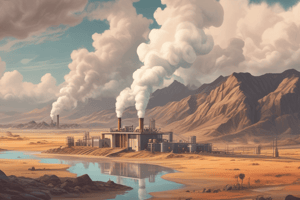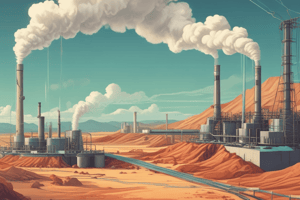Podcast
Questions and Answers
Which of the following are advantages of geothermal energy? (Select all that apply)
Which of the following are advantages of geothermal energy? (Select all that apply)
- High reliability (correct)
- Limited accessibility
- Eco-friendly (correct)
- Cost effective (correct)
- Flexibility (correct)
Which of the following are disadvantages of geothermal energy? (Select all that apply)
Which of the following are disadvantages of geothermal energy? (Select all that apply)
- High reliability
- Possible pollution (correct)
- Financial constraint (correct)
- Minimum land space
Which of the following are considered impacts and threats of climate change? (Select all that apply)
Which of the following are considered impacts and threats of climate change? (Select all that apply)
- Biodiversity depletion (correct)
- Ocean acidification (correct)
- High reliability
- Rising temperature (correct)
Which of the following are types of greenhouse gases? (Select all that apply)
Which of the following are types of greenhouse gases? (Select all that apply)
What is one financial constraint related to geothermal energy?
What is one financial constraint related to geothermal energy?
Flashcards are hidden until you start studying
Study Notes
Advantages of Geothermal Energy
- Eco-friendly: Produces low greenhouse gas emissions compared to fossil fuels.
- High reliability: Provides a stable and continuous energy supply, unaffected by weather conditions.
- Flexibility: Can be used for various applications, including electricity generation and direct heating.
- Minimum land space: Requires less land compared to solar and wind energy installations.
- Cost effective: Low operational costs after the initial investment, leading to long-term savings.
- Helps developing countries grow: Offers a sustainable energy source that can support rural electrification and economic development.
Disadvantages of Geothermal Energy
- Limited accessibility: Geothermal resources are often geographically restricted to certain areas, making it less available in some regions.
- Financial constraint: High upfront costs for drilling and plant construction can deter investment.
- Possible pollution: Risk of releasing harmful substances and greenhouse gases during resource extraction and utilization.
Impacts and Threats
- Rising temperature: Global temperature increases contribute to climate change and ecosystem disruption.
- Shrinking ice sheets: Melting polar ice caps lead to loss of habitat and rising sea levels.
- Sea level rise: Threatens coastal communities and ecosystems due to land inundation.
- Biodiversity depletion: Habitat destruction and climate change risk extinction of various species.
- Ocean acidification: Increased carbon dioxide levels harm marine life and ecosystems.
- Extreme weather: Rising temperatures lead to increased frequency and severity of weather events.
Greenhouse Gases
- Water vapor: The most abundant greenhouse gas, plays a crucial role in the natural greenhouse effect.
- Carbon dioxide: Major contributor to climate change, largely produced by burning fossil fuels.
- Methane: A potent greenhouse gas with a higher short-term warming potential than carbon dioxide.
- Nitrous oxide: Released from agricultural and industrial activities, it has a significant warming impact.
- Chlorofluorocarbons: Synthetic compounds that deplete the ozone layer and contribute to global warming.
Studying That Suits You
Use AI to generate personalized quizzes and flashcards to suit your learning preferences.





